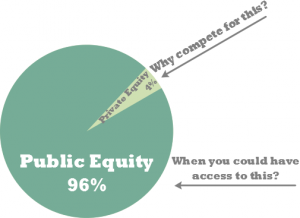Cutting Edge Capital Applauds Today’s SEC Release Regarding Direct Public Offerings
The Securities and Exchange Commission’s announcement today was monumental – but not for the reasons most people had been anticipating.
We connect companies and individual investors in a more personal approach – which is appropriate when you are dealing with the transfer of one’s savings into a company to help it grow or stay healthy.
OAKLAND, CA, UNITED STATES, October 30, 2015 /EINPresswire.com/ -- While the final rules are now out for Title III of the JOBS Act regarding crowdfunding, Cutting Edge Capital was most excited to see that the Commission has also proposed new amendments for Direct Public Offerings. — John Katovich, President, Cutting Edge Capital
Highlights of the Proposed Amendments to Rule 147
The proposed amendments to the Rule that allows companies to raise money from investors within their state without concurrently registering the offers and sales at the federal level would:
- Eliminate the restriction on offers, while continuing to require that sales be made only to residents of the issuer’s state or territory.
- Refine what it means to be an intrastate offering and ease some of the issuer eligibility requirements in the current rule.
- Limit the exemption to offerings registered in-state or conducted under an exemption from state law registration that limits the amount of securities an issuer may sell to no more than $5 million in a 12-month period and imposes an investment limitation on investors.
Highlights of the Proposed Amendments to Rule 504 of Regulation D
These proposed amendments would increase the aggregate amount of securities that may be offered and sold in any 12-month period from $1 million to $5 million and disqualify certain bad actors from participation in Rule 504 offerings, which further protects investors.
The Commission will seek public comment on the proposed rules for 60 days. The Commission will then review the comments and determine whether to adopt the proposed rules.
“Needless to say, Cutting Edge Capital will be supporting the Commission’s efforts to ‘assist smaller companies with capital formation consistent with its investor protection mission,’ said John Katovich, President of Cutting Edge Capital. “In turn, we get ‘company mission protection’ for issuers as they raise funds using the Community Capital Markets, and we connect companies and individual investors in a more personal approach – which is appropriate when you are dealing with the transfer of one’s savings into a company to help it grow or stay healthy.”
JOBS Act - Crowdfunding
The SEC also finally adopted all of the major final rules via Title III of the JOBS Act.
These new rules create a federal exemption under the securities laws so that 6 months from now, companies can offer and sell securities on SEC approved crowdfunding platforms to raise a maximum aggregate amount of $1 million in a 12-month period. A company must conduct its offering exclusively through one intermediary platform at a time.
Cutting Edge Capital’s DPO Lab will now also be offered to companies that need state-of-the art tools to best prepare for creating their own offerings under the JOBS Act.
In addition, the SEC will permit individuals to invest in securities-based crowdfunding transactions on a federal level via approved platforms or through registered broker dealers, but subject to certain investment limitations based on income and net worth. Said Katovich, “how these limitations will be enforced, and who will ultimately be obligated to ensure that individuals will not exceed their limits are specific provisions yet to be described by the SEC, but it should be interesting to see how FINRA deals with this. This could create some additional regulatory and oversight burdens for the platforms.”
The new JOBS Act rules also impose specific disclosure requirements on issuers for information about their business and their securities offering. Companies will be required to file this information with the SEC as well as providing this information to investors and the intermediary facilitating the offering.
“The required disclosures are fairly typical of what any securities offering should have,” said Katovich, “but the audit requirements could still pose additional costs for small companies. While the audited financial requirement will only be imposed after a first-time filing for companies raising $500,000 or more, there is still a ‘reviewed’ financial requirement companies are not normally required to produce for Direct Public Offerings.” In addition, companies relying on the crowdfunding exemption would be required to file an annual report with the Commission and provide it to investors. The cost of preparing for and filing annual reports with the SEC is still unknown at this point.
The JOBS Act rules will require funding portals to be registered with the Commission, and become a member FINRA. These intermediaries will be required to, among other things, provide educational materials that explain investing on the platform, provide communication channels to permit discussions about offerings on the platform, ensure that the types of securities offered and information about the companies have been appropriately listed, comply with completion, cancellation and reconfirmation of offerings requirements and deal with the resale restrictions and investment limits. Portals will also need to take reasonable measures to reduce the risk of fraud, ensure that companies comply with the rules and that they have the means to keep accurate shareholder records. In addition, these intermediaries will need to have a “reasonable basis” for believing an investor complies with the investor limits.
At the same time, these Portals will need to restrict access to prevent fraud and protect investors, refrain from providing advice or recommendations, solicitation, compensation of promoters, and holding, possessing or handling investor funds or securities.
“How intermediary platforms will meet the future FINRA standards for these obligations and restrictions will be interesting,” said Katovich. “Many of these standards are very similar to how broker dealers and exchanges are regulated. And since FINRA already has in place stringent oversight requirements, it’s likely these platforms will come under a similar scrutiny. For platforms to staff up to meet these federal oversight requirements will mean additional compliance costs that will need to be passed on via the fees charged for the transactions. Those fees could begin to get prohibitive, especially considering that the transactions and future secondary market activity will be extremely low for these small, nascent offerings,” added Katovich. “This will make for interesting financial and regulatory dynamics.”
Andy Bamber
Cutting Edge Capital
4153097835
email us here



